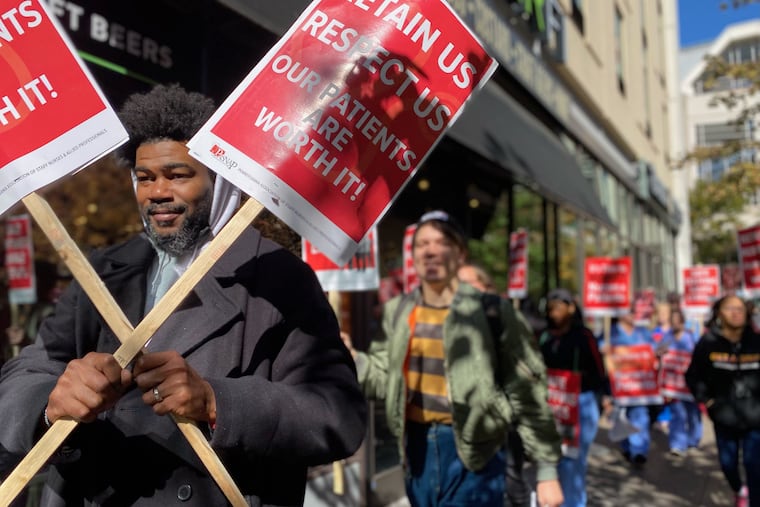Unionized Pa. health care workers find new bargaining strength in the wake of COVID
Nationally, health care workers are pushing for contracts that address disparities laid bare by the pandemic.

Temple University’s unionized health care workers secured a new contract this month that made its nurses the highest paid in Pennsylvania, while lowering their patient loads and enhancing security to make them feel safer while working at the Philadelphia hospital.
The state’s other organized health care workers are now looking to replicate their playbook.
“Temple has been amazing for us,” said Carla Lecoin, a neonatal nurse and labor leader for 900 nurses preparing for contract negotiations in 2023 at Einstein Healthcare Network, which was acquired by Thomas Jefferson University in 2021. “They have been our big sisters, our mentors as we’ve been unionized.”
Temple’s new three-year contract, approved the night before the Nov. 8 midterm elections, showcases how the health care labor movement has emerged from the pandemic energized and aggressive.
High demand for nurses and a worker shortage enabled the union representing Temple’s nurses and the technical workers required to run x-ray machines and other hospital equipment played hardball — even voting to authorize a strike — to win long-coveted concessions.
The new contract requires the hospital to add another nurse to a unit when certain patient census thresholds are exceeded. The hospital must give nurses significant additional pay if it can’t meet the staffing standards, and the standards can only be ignored if both hospital administration and a union representative agree a health emergency warrants it.
Givan called the staffing requirements particularly strong.
Temple also agreed to place weapons detectors and security personnel at every hospital entrance, and retool how it reviews workplace violence incidents so that victims voices are heard.
Today’s tight labor market likely helped Temple’s health care union at the bargaining table, said Rebecca Kolins Givan, an associate professor of labor studies at Rutgers University.
“All those factors have led nurses to get serious about their demands in taking collective action,” she said.
Nurses are in high demand, Givan said, and have no trouble finding other health care jobs to pay the bills if a contract dispute turns into a strike, as threatened at Temple.
The Pennsylvania Association of Staff Nurses and Allied Professionals and SEIU are the two largest nurses’ unions in the state, together representing roughly 17,400 registered nurses. There are nearly 238,000 active, licensed registered nurses in the state.
» READ MORE: On the coronavirus front lines, Philly nurses also battle supply shortages and tension with employers
Health care worker shortage
The pandemic exacerbated longstanding worker issues in health care, prompting a wave of resignations and retirements that strained an already thin workforce. The Bureau of Labor Statistics estimated about 275,000 additional nurses will be needed between 2020 and 2030.
A March survey from the American Nurses Foundation found 60% of acute care nurses were burned out, and 75% described themselves as “stressed, frustrated, and exhausted.”
“The morale among the nurses was very low,” said Mary Adamson, president of the Temple University Hospital Nurses Association. “They were very angry going into this campaign.”
The same sentiment is propelling a unionization drive at Geisinger Community Medical Center in Scranton. Mike Keyasko, a physical therapist, is in the process of organizing 350 hospital technicians, including rehabilitation workers, radiology technicians, and pharmacists.
Before the pandemic, he said, similar efforts fell flat. This year has been different.
“I feel like everything that everybody’s been observing in their workday over the past couple years has led people to question: Why we are just accepting this?” Keyasko said.
Geisinger spokesperson Matthew Van Stone said the hospital acknowledged the frustrations.
“Many of the challenges the union claims to have solutions for are nationwide issues, and Geisinger is no exception,” Van Stone said in a statement, citing efforts to add staff.
COVID workload strains hospital staff
Temple Hospital was ground zero for COVID care in 2020. Patients flooded wards, forcing the hospital to convert a gymnasium and an outpatient pavilion into an overflow COVID ward. Nurses scrambled to care for critically ill people, even as they were afraid for their own health. Vaccines were not yet available, and health care workers were physically and emotionally exhausted.
The pandemic was a tipping point for nurses who felt Temple had been under-staffing units for years, said Adamson. Patient loads stayed high even as COVID cases waned.
“You walk away from the job feeling like we’ve let these people down,” Adamson said.
A Temple spokesperson did not respond to a request for comment, but after concluding contract negotiations the hospital’s statement described it as, “fair and equitable for all parties” and would improve recruitment and staff retention.
Safety concerns in hospitals
Concerns about workplace violence grew after a nursing assistant at nearby Jefferson University Hospital was fatally shot at work in 2021.
Health care providers are among the most likely in the nation to be victims of workplace violence, according to the Occupational Safety and Health Administration.
» READ MORE: As COVID-19 surges, Philly-area nurses describe life on the front lines: ‘It’s just exploded’
Carlos Jesus Aviles, an IT specialist and president of Temple Allied Professionals, described workers regularly finding their cars broken into in Temple’s parking lots on Broad Street, near some of the city’s most violent neighborhoods.
Homeless people have found their way into the hospital and fallen asleep in available beds.
“What’s sadly been happening is the environment has slowly but surely been leaking into the hospital,” said Aviles, who is pleased that the new contract forces the hospital to increase security in the parking lots.